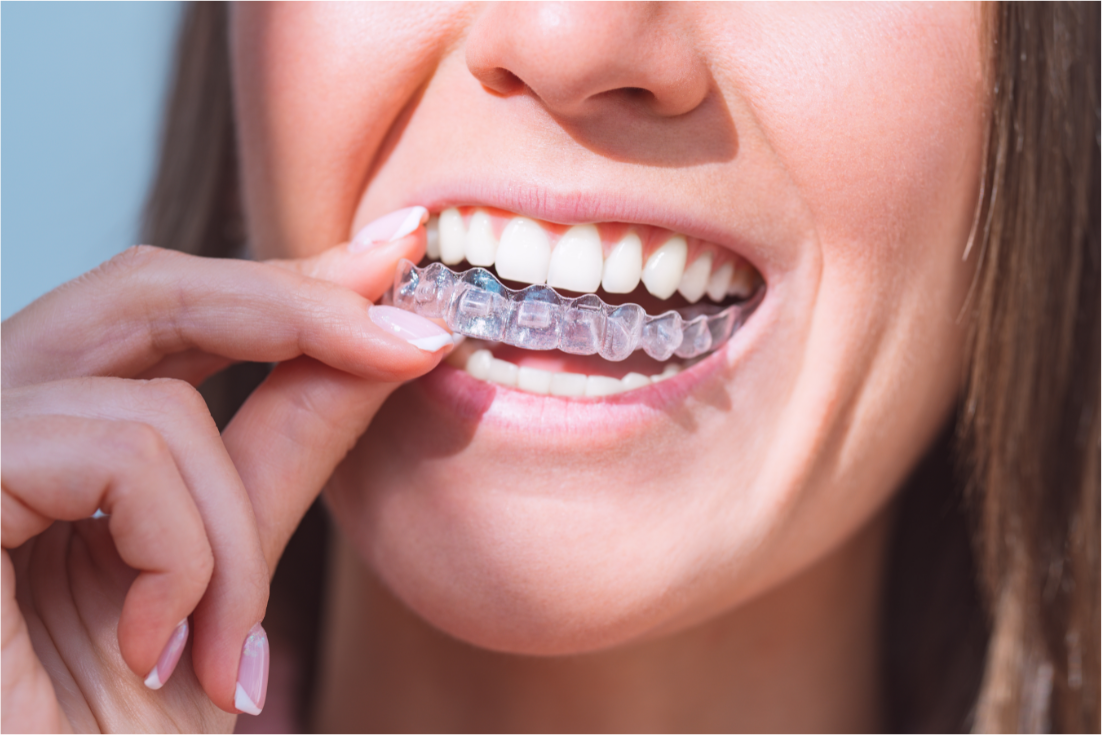Invisalign has revolutionized the world of orthodontics, offering a discreet and comfortable way to straighten teeth. Gone are the days of bulky metal braces, and now people can achieve a beautiful smile without the obvious appearance of traditional braces. However, a question that often arises among Invisalign users is, “Does Invisalign cause cavities?” It’s a valid concern, especially since maintaining proper oral hygiene is essential while wearing aligners.
The good news is that Invisalign itself does not directly cause cavities. However, there are several factors that could contribute to cavity formation if proper care is not taken. Let’s dive deeper into how Invisalign in Woodland Hills works and what you need to do to prevent cavities while using it.
The Basics of Invisalign
Before we discuss how cavities might form, let’s first review how Invisalign works. Invisalign uses a series of clear, removable aligners to shift your teeth gradually into their proper positions. These aligners are custom-made to fit your teeth, and you’ll change them every 1-2 weeks as your teeth move. Unlike traditional braces, Invisalign aligners are removable, which means you can take them out to eat, drink, brush, and floss.
Because of this unique feature, Invisalign offers one significant advantage: you can keep your mouth clean more easily. This contrasts with traditional braces, which have brackets and wires that can trap food and make it more difficult to clean your teeth. But, like any dental treatment, Invisalign requires a commitment to good oral hygiene. The key to preventing cavities while wearing Invisalign is understanding how the aligners affect your oral care routine and making sure you don’t skip any necessary steps.
How Invisalign Can Contribute to Cavities
Although Invisalign aligners themselves don’t cause cavities, there are a few ways that neglecting your oral hygiene routine can lead to tooth decay. Let’s break this down:
Food and Plaque Trapping: Invisalign aligners are designed to fit snugly over your teeth. While this is great for moving your teeth into position, it can also trap food particles, plaque, and bacteria against your teeth. If you don’t remove your aligners to brush and floss your teeth after eating, these food particles can stick to your teeth and lead to plaque buildup. Plaque is a sticky film of bacteria that can erode tooth enamel and cause cavities.
Wearing Aligners with Food or Drink: While Invisalign aligners are removable, some people forget to take them out while eating or drinking. If you drink sugary beverages like soda, juice, or even coffee while wearing your aligners, the sugar and acid in these drinks can stay in contact with your teeth longer, contributing to the development of cavities. If the aligners are left on, they can create a small “seal” that keeps these substances trapped against your teeth, promoting bacterial growth and decay.
Inadequate Cleaning of Aligners: Just as it’s important to brush and floss your teeth regularly, you also need to clean your Invisalign aligners. If your aligners aren’t properly cleaned, bacteria and plaque can accumulate on them, and when you put them back in your mouth, you’re essentially placing bacteria back onto your teeth. This can increase the risk of tooth decay and cavities.
Not Brushing After Meals: One of the biggest risks of Invisalign wearers is the tendency to skip brushing and flossing after meals. Since the aligners are removable, it’s easy to eat, drink, and pop them back in without giving your teeth the attention they need. However, skipping this step can lead to plaque buildup, especially on the surfaces of your teeth that are covered by the aligners.
Also Read: Why Invisalign Is the Top Choice for Teenagers' Orthodontic Journey
How to Prevent Cavities While Using Invisalign
The good news is that cavities don’t have to be a concern if you follow these essential steps to maintain good oral hygiene while using Invisalign:
Brush and Floss After Every Meal: One of the most important steps to take when wearing Invisalign is brushing and flossing after every meal or snack. This ensures that you remove any food particles that could lead to plaque buildup. While wearing your aligners, it’s essential to make sure your teeth are clean before reinserting them. This way, you’re not sealing in bacteria or leftover food that could lead to tooth decay.
Clean Your Aligners: Cleaning your Invisalign aligners is just as important as cleaning your teeth. You should rinse your aligners every time you remove them, and wash them thoroughly with warm (not hot) water. Use a soft toothbrush or a specialized cleaning system to remove any plaque or bacteria that may have built up on the aligners. Never use toothpaste, as it can scratch the aligners and make them more prone to bacteria buildup.
Limit Sugary and Acidic Foods: While it’s okay to enjoy your favorite foods and drinks, try to limit the consumption of sugary and acidic foods while wearing your aligners. If you do indulge, make sure to remove your aligners before eating or drinking, and brush your teeth afterward. Sugary drinks and foods can increase the risk of cavities, especially when they’re in constant contact with your teeth.
Wear Your Aligners as Directed: Invisalign aligners should be worn for 20 to 22 hours per day, and only removed when eating, drinking, brushing, and flossing. It’s important to follow these guidelines closely to ensure that the aligners work effectively and that your teeth continue to shift in the right direction. Wearing them too little or not taking proper care of them can result in suboptimal treatment and oral health risks.
Regular Dental Checkups: Even though Invisalign aligners are removable, that doesn’t mean you can skip regular dental visits. Make sure to visit your dentist every 6 months for a cleaning and checkup. Your dentist can monitor the progress of your treatment, look for any signs of cavities, and address potential issues early on.
The Bottom Line
So, does Invisalign cause cavities? The answer is no—Invisalign itself doesn’t cause cavities, but poor oral hygiene and neglecting to clean your aligners can contribute to cavity formation. By taking proactive steps to keep your teeth clean and healthy while wearing Invisalign, you can prevent tooth decay and maintain the great results of your orthodontic treatment. Taking care of your smile during your Invisalign journey involves more than just wearing the aligners; it requires a commitment to good oral hygiene habits. By brushing and flossing regularly, cleaning your aligners, and being mindful of your food and drink choices, you can ensure that your teeth stay healthy and cavity-free. Remember, the key to preventing cavities while wearing Invisalign is consistency, and making your oral hygiene routine a priority will pay off in the long run with a bright, healthy smile.
If you’re ready to begin your Invisalign journey or have questions about maintaining oral health with aligners, don’t hesitate to reach out to your dental provider. They’ll guide you through the process and ensure that you have all the tools you need to succeed.
Have questions about Invisalign or need advice on keeping your teeth cavity-free during your treatment? Contact Woodland Hills Dental Care today to schedule a consultation and get personalized guidance for your Invisalign journey!


